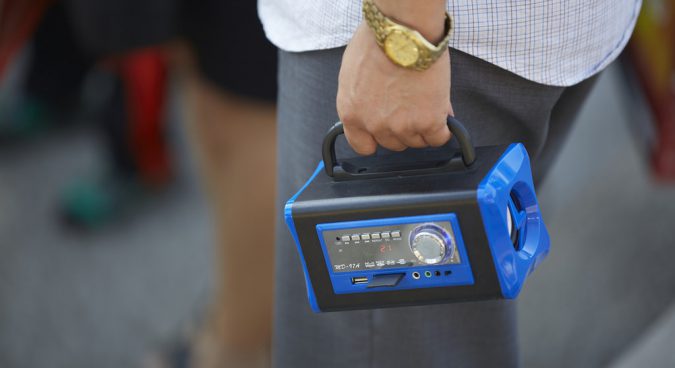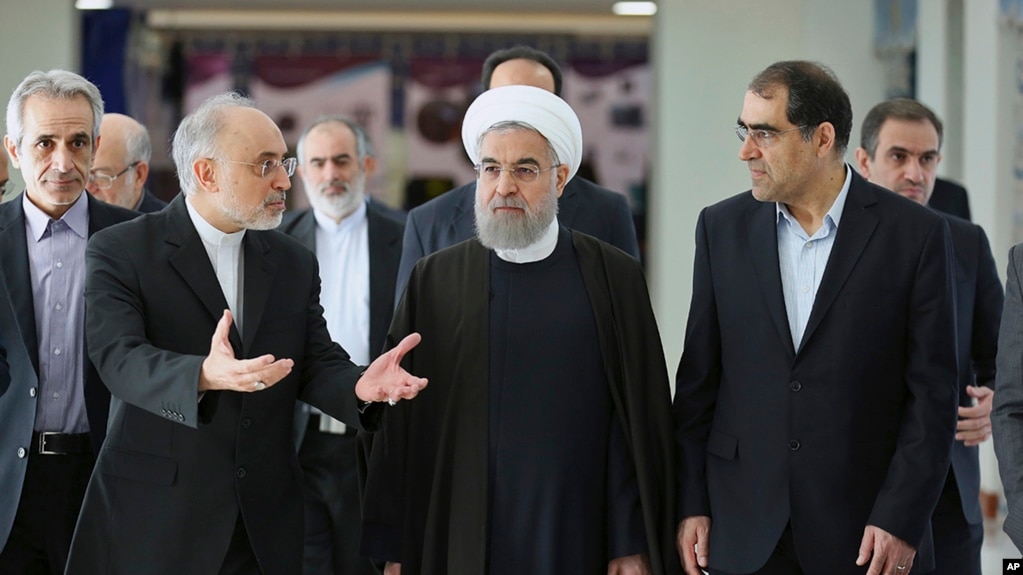U.S.-Cuba Thaw Could Muffle Air Wars
by Randy J. Stine
on 03.03.2015
Intentional Cuban-spawned interference to U.S. AM radio
stations, mostly in southern Florida, has become less of a problem in recent
years. Newly improved relations between the United States and the communist-run
island nation may eliminate the problem forever, according to several
observers.
 Former Cuban leader Fidel Castro’s efforts to
block U.S. broadcasts from reaching his country, sometimes referred to as
“radio wars,” are well documented. High-powered Cuban radio transmissions
occasionally have interfered with U.S. AM radio broadcasts since the mid-1980s.
Former Cuban leader Fidel Castro’s efforts to
block U.S. broadcasts from reaching his country, sometimes referred to as
“radio wars,” are well documented. High-powered Cuban radio transmissions
occasionally have interfered with U.S. AM radio broadcasts since the mid-1980s.
Most AM experts contacted for this article believe the
electronic warfare was in response to the U.S. government’s launch of Radio
Martí in 1984.
The Broadcasting Board of Governors is an independent
federal agency responsible for U.S. government-sponsored civilian international
broadcasting. Its Office of Cuba Broadcasting oversees Radio Martí, whose
mission is to promote freedom and democracy by providing the people of Cuba
with objective news and information programming.
Cuba, which sits just over 90 miles south of Key West,
Fla., continues to jam Radio Martí’s short- and medium-wave broadcasts into
that country regularly.
Cuba is not a signatory to the International
Telecommunication Union’s Region II Agreement governing Western Hemisphere
radio allocations, and the country doesn’t conform to the restraints of the
agreement, according to sources. At one time Cuba employed a network of
high-power AM transmitters that created noise to intentionally jam the
broadcast signals of AM stations as far away as Utah, Minnesota, Iowa and Ohio,
observers said.
|
|
|
Florida Association of Broadcasters
President/CEO C. Patrick Roberts said the number of reported instances of
interference has declined in the past decade.
|
“Purely anecdotal evidence … seems to show the
interference from Cuba as being less of a problem now,” said one person
familiar with the situation.
Florida Association of Broadcasters President/CEO C.
Patrick Roberts said the number of reported instances of interference is down
the past decade, though some of the improvement may be attributable to power
increases at a dozen or more AM stations in Florida.
“We really haven’t had any recent complaints [about
interference]. It used to be an ongoing problem, but less so in recent years. I
would say it has been less of an issue the past 10 years,” said Roberts. He
predicts such interference will drop off further thanks to political change.
SPECIAL TEMPORARY AUTHORITY
A number of AM stations in Miami and across Florida have
for years operated at increased power levels under special temporary authority
from the FCC in order to combat the effects of jamming, according to Roberts.
For example, iHeartMedia station WINZ(AM), Miami, at 940
kHz is licensed for 50 kW daytime and 10 kW at night but has operated at 25
kilowatts at night under STA to overcome skywave interference from Cuban
station CMKD, according to FCC records.
The STA dates to 1981; the commission has been regularly
granting the extensions at six-month intervals. WINZ most recently received an
extension in September 2014; it expires March 5, 2015, according to FCC data.
“This authority is subject to termination upon reduction
of power or cessation of operation by the Cuban operation or upon commission
instruction to WINZ, at which time WINZ must return to licensed operating
parameters,” the commission states in the documents.
The FCC said the exact number of AM stations employing
STA-granted higher-power to help overcome Cuban interference is unavailable.
Similar arrangements are in place at Miami area AMs like
WAXY (Lincoln Financial Media), WQAM (CBS Radio), WHIM (Caron Broadcasting, a
subsidiary of Salem Communications), WIOD (iHeartMedia), WQBA (WQBA[AM] License
Corp.) and WSUA (WSUA Broadcasting Corp.), according to observers.
AMs operating with STAs could face challenges renewing
their authorizations if those are no longer justified, according to those
familiar with the practice.
Roberts believes AMs that have STAs now will keep those.
“Many have been at these higher power levels for a long time. I don’t expect a
policy change at the FCC regardless of improving relations between the two
countries.”
|
|
|
Cuban
rapper Naykon (center) joins Radio Martí’s Juan Juan Almeida (left) and
Lizandra Diaz Blanco (right) on “1800 Online,” featuring irreverent
interviews with bloggers, artists, entrepreneurs, technology aficionados,
sports and entertainment celebrities, bridging Cubans living both on and off
the island.
|
DIRECTIONAL ARRAYS
AM broadcasters affected by the consistent jamming in the
1980s through the early 2000s have spent a lot of money on their facilities to
boost power levels and build directional arrays, according to one AM radio
expert.
Several broadcast engineering consultants familiar with
south Florida AMs declined to comment for Radio World because of the sensitive
nature of client work.
The major U.S. policy shift toward the communist-run
island announced late last year by President Barack Obama could eventually
increase the flow of free media into Cuba, experts believe.
However, the long-term impact of the most recent
developments on Radio Martí broadcasts to Cuba is not clear, those familiar
with the government service said. The Office of Cuban Broadcasting has a 2015
budget request of about $27.1 million; OCB employs approximately 117 employees, plus
contractors.
OCB Director Carlos Garcia-Perez said the shift in U.S.
policy concerning Cuba does not change the mission of Radio Martí, which is to
deliver news and information to people in Cuba so its citizens can make
educated decisions regarding their future. Radio Martí “is more relevant than
ever before. Our work is more important than ever,” said Garcia-Perez.
He compares the work of Radio Martí to other
government-supported programming, such as Radio Free Europe, “that is still delivered
to what are now allied nations. They’ve continued to broadcast in those cases,”
Garcia-Perez said.
Cuba is successful in jamming some of Radio Martí’s
24-hour shortwave and medium-wave transmissions into the country, but not all,
according to Garcia-Perez.
The government radio service also relies on the use of
social media, mobile devices and its website to bypass the broadcast jamming
and get content into Cuba, Garcia-Perez said.
“Our numbers of website hits have been way up since the
announcement by President Obama. Our website provides circumvention tools to
help our audience in Cuba eliminate censorship,” Garcia-Perez said.
OCB also uses SMS text messaging to communicate directly
with almost a million Cubans cell phone users, according to its website.
Not everyone is supportive of Martí, which faces
increased political scrutiny.
In January, Minnesota Democrat Rep. Betty McCollum
reintroduced a measure to end U.S. taxpayer funding of Radio and TV Martí. Over
the 30 years the U.S. has funded these efforts, they have cost taxpayers $770
million, and in 2015 Cuba broadcast will cost American taxpayers $27 million,
according to McCollum, who characterized Radio and TV Martí as “outdated Cold
War artifacts” and “propaganda broadcasting” in the measure.
McCollum submitted the same bill in 2011, but the measure
failed to garner enough support to pass Congress.
New BBG CEO Andrew Lack, sworn in this January, has not
commented publicly about how the latest developments may impact Radio and TV
Martí.
The Committee for U.S. International Broadcasting — which
describes itself as a nonpartisan, nongovernmental organization working to
strengthen flow of uncensored news to countries with restricted and developing
media environments — remains supportive of Radio and TV Martí.
“This is not the time to curtail nor eliminate funding to
OCB,” said Ann Noonan, CUSIB co-founder. “OCB funding is not a waste of money.”
CUSIB has warned that it’s unlikely changes in the
relationship between the U.S. and Cuba will result quickly in a free press in
Cuba.
With Raul Castro in January “calling for the end of Radio
and TV Martí broadcast into Cuba in order to normalize relations, it is
unlikely Cuba will embrace the idea of a free press,” Noonan said.
CUSIB co-founder Ted Lipien noted in the online Digital
Journal in January that Radio and TV Martí reporters were still not being
allowed travel to Cuba and report from there.
The Castro regime “is likely to fight tooth and nail to
prevent media freedom,” wrote A. Ross Johnson, a former director of Radio Free
Europe, and S. Enders Wimbush, a former member of BBG, in an op-ed piece in the
Washington Post in January.
- See more at:
http://www.radioworld.com/article/us-cuba-thaw-could-muffle-air-wars/274803#sthash.2e01jYPC.dpuf









